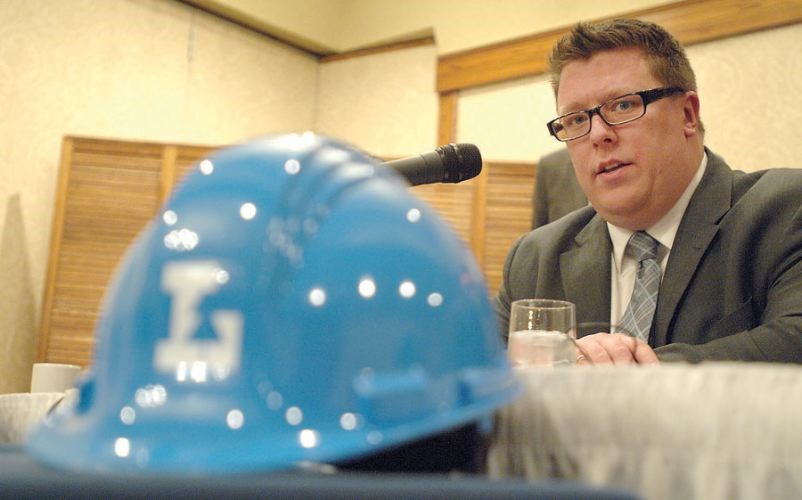Lakeland Mills will be running again by the end of next summer, the president of the Sinclar Group pledged Wednesday.
A contingent of officials from Sinclar Group, the main ownership partners in the Prince George sawmill, made the announcement about the 2014 reopening, first to a separate gathering of employees, then to local media at a news conference.
Company president Greg Stewart called April 23, 2012 "the worst day in Lakeland Mills history. It began a year of challenge and sorrow for all of us." It was the night the sawmill facility exploded and burned. Glenn Roche and Alan Little died as a result, numerous other workers were injured and 150 people were put out of work.
There was also uncertainty about whether Lakeland would be or even could be rebuilt. On top of practical realities like a tight fibre supply (the amount of trees in the forest) in the region, a displaced labour pool scrabbling for alternate employment, and customers no longer getting wood products from their supplier, there was also the forensic realities of an insurance probe, coroner's investigation, WorkSafeBC and BC Safety Authority investigation and the fact the Babine Forest Products mill in Burns Lake met a similar fate only a couple of months earlier.
The investigations by provincial authorities have been completed but transferred to Crown counsel for final overview but the insurance company has not finished its investigation.
"We made the decision to rebuild despite any decisions on final insurance settlement," Stewart said. There were many factors, and a big one was the wood the company has at its disposal. Unlike Babine Forest Products in Burns Lake, where wood will have to be found from various sources to justify operating their rebuilt mill, Sinclar Group had their own cache of trees.
Lakeland Mills Ltd. has an annual allowable cut of 250,000 cubic metres and the now-closed Winton Global Mill division of the company has tenure for 505,000 cubic metres more.
Stewart said the customer base was also strong. They were one of the first Canadian forest companies to get wood supply contracts in Asia - specifically Japan - and that market will still buy from them once they are back on their feet, he said. Additionally there are talks underway with interests in China.
"Without a doubt, the pricing of lumber is incredibly influential," said Stewart. "But we are in a commodity market and prices are bound to fluctuate. We have the United States market showing positive signs, we have the Japanese market, those were there before, but there is a whole supply and demand system that now has China added in, so what our forest industry doesn't know yet, is how that will equilibrate."
It is not yet known what the mill will look like, how much wood it will be set up to cut in a day, or what milling equipment it will use. Stewart said he was aware that building a new mill from scratch was an exciting prospect, but the correct technologies had to be carefully chosen to fit the rebuilding budget.
"The mill will continue to produce stud lumber, with the ability to manufacture metric lengths in addition to the American Lumber Standard," said Stewart. "Introducing this flexibility will allow Lakeland to diversify its markets. The mill will be integrated with the existing planer mill, which is still operational, and the energy system Lakeland operates in partnership with the City of Prince George. It will incorporate the most advanced safety protocols available in all areas of its operations to ensure a safe work environment."
He anticipated the mill would require a workforce of about 100 people and run in two shifts.
On hand at the announcement was United Steelworkers union president Frank Everitt, whom Stewart praised for his guidance throughout the ordeal. Everitt reciprocated by saying "I cannot thank you enough. I know you've made a lot of employees happy today."
Stewart said: "As a company, we believe in this community. Three generations of owners and employees have lived and worked here for 50 years. So this decision is as much about our belief in family and community as it is a good business decision. And it is a good business decision."
Acting-mayor Cameron Stolz said a revitalized Lakeland Mills would be "a key economic piece to the City of Prince George" and the rebuild announcement was a sign of faith in the overall local economy.



